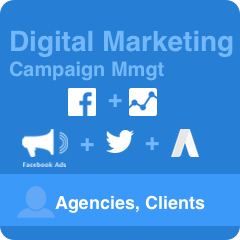
Whether you’re developing a website or a mobile application, at the end of the day, your primary goal is to generate conversions. No matter how sophisticated, unique, and well-designed your app, if it fails to drive potential audience then all your development and design strategies go down in vain.
There is only one way to generate traffic for your mobile app, and that’s by marketing. There are numerous methods that you can follow to market your mobile app, if I discuss all of them, my blog post will go on and on. So in order to keep it concise and relevant, let’s focus on one type of marketing: In-app marketing.
What is In-App Marketing?
In case you don’t know, In-app marketing is any type of marketing campaign or message that is exclusively designed to be displayed within your mobile app to reach your active users. As opposed to the other forms of app marketing, in-app marketing gives you the opportunity to connect with your most loyal customers and entice them to complete certain tasks and even make purchases.
Why You Need an In-App Marketing Strategy?
Statistics reveal that it is much more expensive to get a conversion as opposed to retaining your current customers. So if you don’t have a strategy for reaching out and connecting with your existing users, you might end up losing them faster than you can drive new ones.
Here are the types of in-app messages:
- Banner notification to give a push notification feel
- Full-page display messages
- Tooltips
- A message at the center of the screen
- Messages in an in-app central repository

Now that we’ve understood what in-app marketing is, let’s get back to understanding how you can get started with in-app marketing.
5 Steps for Implementing In-App Marketing
Creating an In-App Marketing Strategy
The first thing you’ll have to do for implementing in-app marketing is to do research and compile a list of all your best users. The users that have been using your mobile app for a while and continuously engage with your app. Figure out what makes them stand out from the rest? how do they interact with your mobile app?
Doing the research and analyzing your best users will help you define a good app marketing strategy. Here are some essential questions that you need to ask yourself for formulating an in-app marketing strategy that works:
- What is your app’s unique value proposition?
- How often do your best users engage with your mobile app?
- How many notifications should you send your users and how many will be too many?
- How can you improve your onboarding flow to attract new users?
- What is the particular behavior that you want to encourage from your users?
When doing research and formulating your strategy, don’t forget that your strategy should encapsulate the onboarding process, user engagement, and user retention.
Analytical Tools
Whether you’re trying to rank on Google, in the app store, or you’re trying to retain your users, analytics are essential for creating as well as implementing your strategies. These analytics will strongly influence your in-app marketing strategy.
Analytics help you make the right decisions and also measure the success of your in-app marketing. After you have created an in-app marketing strategy, it’s time to figure out the tools that you will be using for viewing and utilizing your app’s analytics. Below I’ve mentioned some tools that are easy to integrate with your mobile app:
- Amplitude
- Mixpanel
- AppsFlyer
- Heap
Promoting New and Existing Features
The majority of the expert mobile app development companies regularly integrate new features in their mobile apps to keep their users engaged. However, if your users never interact with these features, then all your efforts go down in vain. If you want to improve your ‘feature’ visibility, then in-app marketing is one of the best ways to accomplish this goal. In fact, this tactic is useful for both new as well as existing features (in-app marketing can be used to entice your users to interact with your existing features).
When you’re launching a new feature, make sure that you notify your customers about it. You can do this by sending out notifications or by using modals to let your users know about your latest releases.
Upselling
Like I’ve already mentioned above, the main objective of developing and promoting your mobile apps is to ‘make money’. I think that one of the biggest advantages of in-app marketing is the opportunity it provides for ‘upselling’.
However, it’s essential that you keep it minimal otherwise your users can get annoyed and uninstall your app altogether. Instead of bombarding your users and pushing them to avail deals and make purchases, look for the right opportunity to smoothly encourage your users to purchase a certain feature or a product. Make sure that you highlight the benefits that a particular feature or product will provide.
Gathering Feedback
If you want to generate more conversions, you will constantly have to update and improve your mobile app. One of figuring out which improvements are required; you should listen closely to your customer’s feedback. You can use an NPS survey or request your users to fill out an NPS survey or questionnaire for more thorough feedback. Check out how twitter gather’s customer feedback:
You can also use in-app behavioral analytics to measure your customer’s feedback. For example, if you notice that a user is unable to finish a task even after restarting it multiple times, or if a user repeatedly taps on the same button multiple times, then the user might be confused or frustrated. You can use this data to improve the performance of your mobile app.
Get Started with In-App Marketing:
If you can define a successful in-app marketing strategy, you can satisfy your users, retain them, and drive more sales. Furthermore, in-app marketing will help you engage your new users and retain them for the long-run.
I hope that this article will prove valuable to you. If you’d like any more information for creating an effective in-app marketing strategy, feel free to get in touch. We would love to hear from you.




